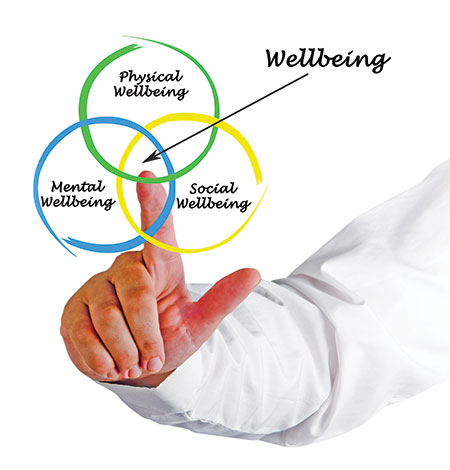“Lifestyle plays an essential role in both physical and mental health,” maintains Hashil Hatif Al-Hatmi, who places the onus of fitness on mental well-being to enjoy a stress-free and healthy life. According to him, if an individual’s lifestyle is poor, it will directly reflect on their physical and mental health.
A self-determined, optimistic, adventurous, opened-minded and solution-focused, multicultural individual, Hashil, Assistant Psychologist and Mental Health Worker at Royal Hospital, has found his niche as a confident public speaker and motivational expert, with an interesting penchant for perfumes. He has relied on various platforms to create awareness and spread the message of mental wellbeing.
His interest in psychopathology is long-standing and stems from a traumatic head injury at a young age. This was further strengthened after a second critical incident when he had appendicitis and had to get his appendix removed. “This resulted in me being hospitalised for a month; it motivated me to change my diet with the support of my mother, who is a nutritionist,” he states. Following the surgery in December 2005, he made quick progress in weight loss, becoming more physically active, healthier, athletic and very health conscious. “This coupled with work experience in the field where I worked along-side mental health professionals (psychiatrists and psychologists) and endocrinologists consequently heightened my curiosity and passion for the field,” he adds.
In the following interview, he expounds on the importance of inculcating positive habits and lifestyle changes to craft individual stories with health plots.
What is mental health and how important is mental wellness in overall health?
Firstly, mental health is a person’s condition regarding their psychological and emotional well-being. Secondly, ‘there is no health without mental health’, which means that when one’s physical health has been affected in any way, for instance, being diagnosed with a chronic illness, it will automatically affect the way they view themselves, the world, and their environment. Therefore, being diagnosed with a chronic illness, such as cancer, diabetes and heart diseases, can lead an individual to feel emotionally distressed.
What are some of the common mental health problems in the world today?
Depression, anxiety disorders, psychosis, schizophrenia, personality disorders (like borderline personality disorders), neurodevelopmental disorders (such as ADHD and Autism), eating disorders and psychological disorders related to gender and sexuality (gender dysphoria and paedophilia, respectively).
Is there a link between one’s mindset and mental health?
Yes, there is. According to Stanford psychologist Carol Dweck, there are two key belief systems that relate to these beliefs: fixed versus growth mindset.
If we hold a fixed mindset, we assume that our character, intelligence, and abilities are static and cannot be changed. This could manifest in us believing that we cannot, for instance, influence our future wellbeing.
A growth mindset is one in which we see we have capacity to change. We may, for instance, believe that wellbeing can be achieved through increased effort and skill development. Research has shown that a growth mindset allows people to navigate stress and challenges better and can lead to higher levels of wellbeing (Maps, 2016).
What are the causes for the growing increase in depression cases?
Genetics (family history); biochemical factors (brain chemistry); chronic illness; personality style; ageing, long-term pressures such as abusive relationships, bullying and work stress and stressful or traumatic events.
Does environment also have a role to play in ensuring overall wellness?
Yes, it does. Depression can often be triggered by very stressful life situations or other factors such as the death of a loved one, a move, a divorce, financial difficulties or job loss and social isolation.
Can stress trigger or escalate mental health issues?
Yes, it can. Chronic stress can affect one’s cognition (memory), emotion (mood), behaviour (sleep), and physical health (aches and pains). Chronic stress can also increase cognitive distortions such as, pessimism, negative self-talk, all-or-nothing attitude, rigid thinking and catastrophising.
What are some of the dos and don’ts to follow to correct the imbalance between one’s lifestyle and health?
Dos:
- Smile – Scientific American even collated some studies that proved smiling can actually make you feel better.
- Get enough sleep – Lack of sleep may lead to a host of health problems, including obesity, diabetes, and even heart disease.
- Meditate often – Meditation quietens your mind and calms your soul. It can also help you deal with and manage the stress in your life
- Exercise regularly – If you can exercise, don’t do it just a few times a week, do it every day. Movement is key to a healthy life.
- Cut down on processed food – Processed foods are not good because (1) most nutritional value is lost in the making of these foods and (2) the added preservatives are bad for our health.

Don’ts:
- Don’t skip breakfast – The first meal of the day is very important. Don’t think you are controlling your weight by skipping breakfast. Children score better on tests and in school after having breakfast!
- Don’t smoke or drink alcohol – Stay away from cigarettes and alcohol! Stay away from lung cancer, heart diseases and liver diseases! Drinking one glass of wine occasionally is acceptable for adults. Over drinking is dangerous because it can lead to blackouts, poor judgment, car accidents, neuropathy and more.
- Don’t worry too much or get stressed – Appreciate each moment as it happens. Too much anger, unnecessary worries or stress are no good. The past is already behind you.
- Don’t spend time with negative people – Spending time with someone negative eventually gets you down as well.
Any tips/suggestions to help people enjoy positive mental health?
- Value yourself
- Take care of your body
- Surround yourself with good people
- Learn to coping techniques and stress management
- Quiet your mind through mindfulness and meditation
- Set SMART goals
- Be proactive and productive
- Identify and use your strengths
- Develop gratitude
- Get plenty of sleep
Tips for people with busy lifestyles:

- Find some quick stress relievers. Stress relief strategies such as breathing exercises can help you to turn off your body’s stress reaction; it will help you put a halt to chronic stress and can get back to your busy life.
- Limit your caffeine intake. Learn more about the effects of caffeine and the advantages of limiting your intake and find ways to get more energy with less caffeine.
- Get more sleep into your life. When your schedule is busy, often sleep is the first thing to be cut back, either intentionally or by default. This is unfortunate because it can leave you feeling lethargic and lead to errors that take more time out of your day to correct.
- Build quick exercise into your schedule. If you’re feeling lethargic, a little exercise will actually leave you more energised, not less.
- Develop a ‘Can Do’ attitude. Read more on developing an attitude that repels stress during busy times.
- Build fast stress relief into your lifestyle. If you don’t have time for a new stress management regimen, these stress relievers provide maximum impact for minimal time expenditure. Things like taking your vitamins and playing music in the background, for example, fit nicely into even the busiest lifestyle, and provide surprisingly significant stress relief benefits.
- Learn to say ‘no’. People have different reasons for being busy, but many people find themselves busy no matter what their circumstances because they have trouble saying no to other people’s demands on their time. Adopt a plan for getting better at saying yes to a freer schedule and saying no to other people’s demands on your time.



